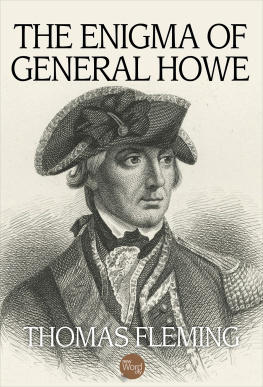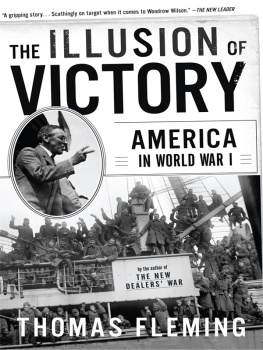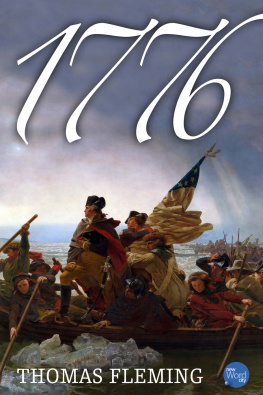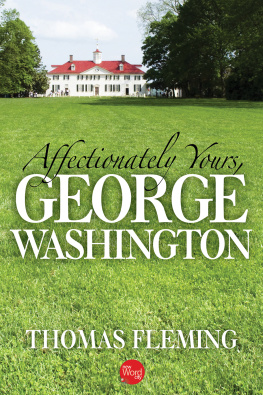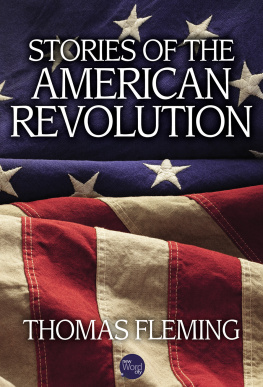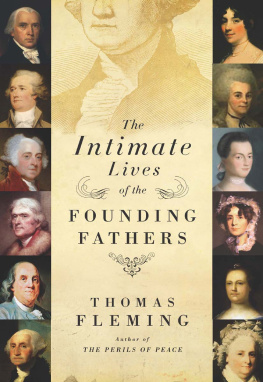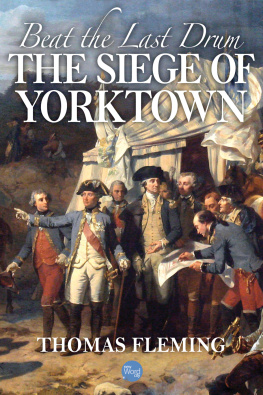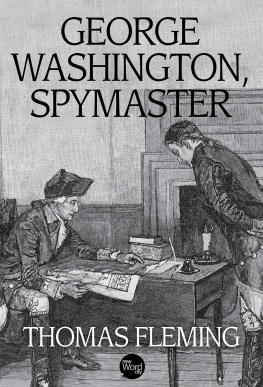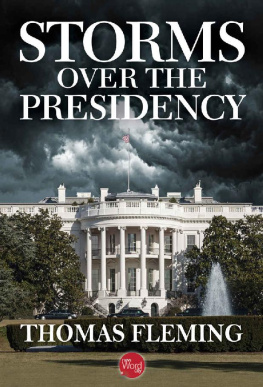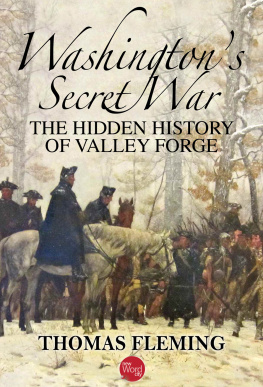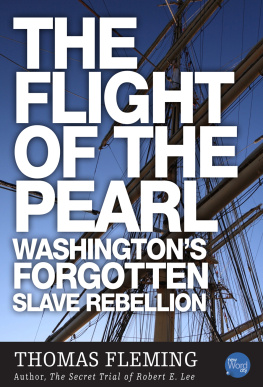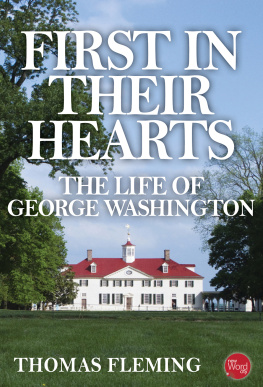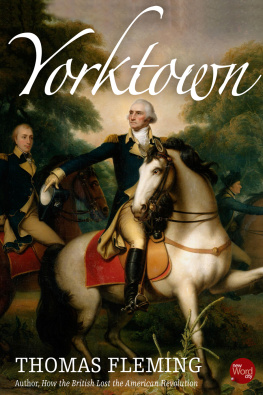Thomas Fleming - The Enigma of General Howe
Here you can read online Thomas Fleming - The Enigma of General Howe full text of the book (entire story) in english for free. Download pdf and epub, get meaning, cover and reviews about this ebook. year: 2017, publisher: New Word City, Inc., genre: History. Description of the work, (preface) as well as reviews are available. Best literature library LitArk.com created for fans of good reading and offers a wide selection of genres:
Romance novel
Science fiction
Adventure
Detective
Science
History
Home and family
Prose
Art
Politics
Computer
Non-fiction
Religion
Business
Children
Humor
Choose a favorite category and find really read worthwhile books. Enjoy immersion in the world of imagination, feel the emotions of the characters or learn something new for yourself, make an fascinating discovery.
- Book:The Enigma of General Howe
- Author:
- Publisher:New Word City, Inc.
- Genre:
- Year:2017
- Rating:3 / 5
- Favourites:Add to favourites
- Your mark:
- 60
- 1
- 2
- 3
- 4
- 5
The Enigma of General Howe: summary, description and annotation
We offer to read an annotation, description, summary or preface (depends on what the author of the book "The Enigma of General Howe" wrote himself). If you haven't found the necessary information about the book — write in the comments, we will try to find it.
General William Howe had a reputation as a bold, resourceful commander. Yet in battle after battle, he had George Washington beaten - and failed to pursue the advantage. Was Sir Billy all glitter and no gold? Or was he actually in sympathy with the rebellion? Here, in this essay by New York Times bestselling author Thomas Fleming are the answers.
The Enigma of General Howe — read online for free the complete book (whole text) full work
Below is the text of the book, divided by pages. System saving the place of the last page read, allows you to conveniently read the book "The Enigma of General Howe" online for free, without having to search again every time where you left off. Put a bookmark, and you can go to the page where you finished reading at any time.
Font size:
Interval:
Bookmark:
Had Sir William Howe fortified the Hills round Boston, he could not have been disgracefully driven from it: had he pursued his Victory at Long Island, he had ended the Rebellion: Had he landed above the lines at New York, not a Man could have escaped him: Had he fought the Americans at the Brunx, he was sure of Victory: had he cooperated with the N. Army, he had saved it, or had he gone to Philadelphia by land, he had ruined Mr. Washington and his Forces: But as he did none of these things, had he gone to ye D---l before he was sent to America, it had been a saving of infamy to himself and of indelible dishonour to this country.
These searing words, from a secret memorandum found in the British Headquarters papers, were written by Sir Henry Clinton, the man who succeeded Sir William Howe as commander in chief of the British army in North America. Clintons comments sum up one view of this strange general into whose hands King George III granted the power to quash the rebellion of his North American colonies. But his is by no means the only view. When Howe was relieved as commander in chief in 1778, Loyalist John Andr, a favorite in both British and colonial society until he was found to be a spy, testified that the most gallant of our officers, and those whom I least suspected of giving such instances of their affection, shed tears while they bade him farewell.
To fellow officer Joseph Galloway, on the other hand, Howe was nothing but an incompetent bumbler. Blunder upon blunder is incessantly rising in its view, he wrote in a pamphlet after Howe resigned, and as they rise they increase in magnitude... so that their possibility almost exceeds the utmost extent of our belief. Even more reproving was the opinion of another Loyalist, who wrote a letter from New York describing both the general and his brother, Vice Admiral Richard Howe, who at the same time commanded the British fleet in American waters. The Howes are both anti-ministerial men, he wrote, and their minds are poisoned by faction: they have endeavoured by every means to spare the Rebellion in order to give it and the Rebels an air of consequence at home.
The British Parliament was as baffled by William Howe as everyone else. After he resigned and returned to England, a committee investigated his conduct of the war. Howe submitted his vast correspondence with Lord George Germain, Secretary of State for American Colonies, plus a forty-page narrative; other witnesses, including the distinguished General Charles Cornwallis, testified, mostly in Howes favor. But the committee never issued a report.
American opinion of Howe is equally confusing. Alexander Hamilton called him that unintelligible gentleman. Former British officer turned Continental army general Israel Putnam said flatly that Sir William was either a friend of America or no general. And John Adams wrote to his wife that it was impossible to discover the designs of an enemy who has no design at all. But Major General Charles Lee, who knew Howe well, hailed him as an executive soldier in which capacity he is all fire and activity, brave and cool as Julius Caesar.
This much we know: During his two and a half years as British commander in chief, William Howe never lost a battle when he was in personal command of his army. Every time he met Washington in the field, he thrashed him unmercifully. Yet Howe failed to end the rebellion. Again and again, Washington escaped to fight another day. The climax of this strange reversal of the rules of war was Saratoga. While Howe was whipping Washington at Brandywine and Germantown and capturing Philadelphia, the capital of the new United States of America, he was simultaneously turning his back on John Burgoyne and his northern army, to the ultimate disaster of the British cause. Burgoynes surrender at Saratoga brought France into the war and turned a family quarrel into a world conflict for which England was totally unprepared. Even as he marched his triumphant regiments into the rebel capital, Howe could justly be accused of losing the war.
What went on in Howes head is a question historians have been debating ever since. Unfortunately, there is little documented evidence. The Howe family papers were destroyed by a fire in 1845, and Sir William was not in the habit of writing personal memoranda, as was Sir Henry Clinton. He was also an especially taciturn man, so there are few personal statements passed on by third parties. But the evidence we do have puts Howe and the Revolution - in a light seldom seen in U.S. textbooks.
When William Howe arrived in America in the spring of 1775, he was forty-five years old, a solidly built, six-foot soldier with snapping black eyes and a glittering reputation. In the French and Indian War, he had been the daring young colonel who led the forlorn hope up the supposedly impregnable Heights of Abraham, to initiate the battle which won Quebec and Canada. Howe had fought with distinction in other campaigns, too, notably the siege of Havana and the foray against Belle Isle off the coast of France. Throughout his army career he had been known as a daredevil, a reputation he enhanced, in the intervals between wars, by a fondness for the gambling table.
The Howe family had a tradition of friendship with America. The oldest brother, Lord George Augustus Howe, had died in the battle for Fort Ticonderoga in 1758 (expiring in Israel Putnams arms), and the Commonwealth of Massachusetts had erected a monument in his honor in Westminster Abbey. It was to Howes next oldest brother, Admiral Lord Richard Howe, that Benjamin Franklin turned in a last desperate attempt to heal the deepening rift between the colonies and the mother country.
The Howes were Whigs, members of an opposition to George IIIs harsh colonial policy that included political theorist and philosopher Edmund Burke and the vituperative Charles James Fox, who declared that if he had lived in America, he would have been among the first to take up arms against the Tory-dominated Parliament. William Howe held the family seat in the House of Commons, and in the election of 1774, to placate the pro-American merchants of Nottingham, he had declared that he would never accept a commission to serve against America. Many of his constituents took a dim view of the way he forgot this campaign promise when George III proffered the job, and they let the general know it. On February 21, 1775, shortly before he sailed for America, Howe gave them a most illuminating answer.
My going thither was not of my seeking, I was ordered, and could not refuse without incurring the odious name of backwardness to serve my country in distress. So contrary are mens opinions here [in London] to some with you, that instead of the grossest abuse, I have been most highly complimented upon the occasion by those who are even averse to the measures of the administration. Every mans private feelings ought to give way to the service of the public at all times: but particularly when of that delicate nature in which our affairs stand at present... One word for America: you are deceived if you suppose there are not many loyal and peaceable subjects in that country. I may safely assert that the insurgents are very few, in comparison of the whole people... With respect to the few, who, I am told, desire to separate themselves from the Mother Country, I trust, when they find they are not supported in their frantic ideas by the more moderate, which I have described, they will, from fear of punishment, subside to the laws...
Almost every line of this letter is telling. Howe speaks of private feelings which he frankly admits he is suppressing for the sake of public policy. Above all, he bases his case on the supposition that he is going to the colonies not to oppress a free people, but to rescue the majority from the tyranny of a few demagogues. He also makes a point of letting his constituents know that those averse to the measures of the administration - by which he meant men like Fox and Burke - have complimented him. Why would Fox or Burke - who was about to make his great plea to Parliament for the conciliation of the American colonies - compliment Howe, unless they thought he was going to heal wounds, rather than incur fresh ones?
Next pageFont size:
Interval:
Bookmark:
Similar books «The Enigma of General Howe»
Look at similar books to The Enigma of General Howe. We have selected literature similar in name and meaning in the hope of providing readers with more options to find new, interesting, not yet read works.
Discussion, reviews of the book The Enigma of General Howe and just readers' own opinions. Leave your comments, write what you think about the work, its meaning or the main characters. Specify what exactly you liked and what you didn't like, and why you think so.

